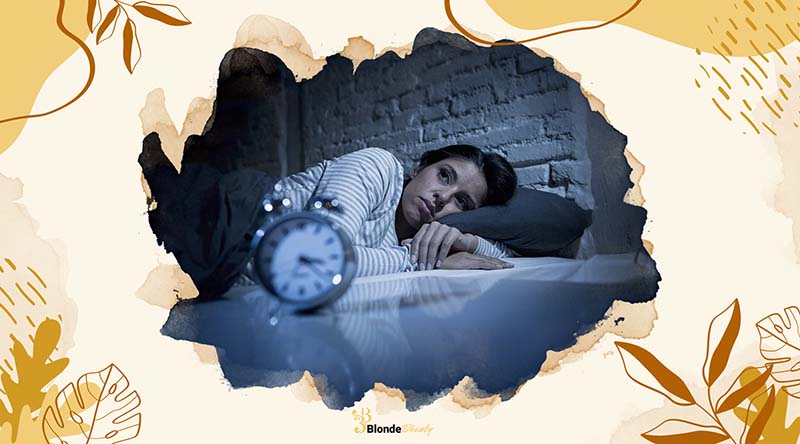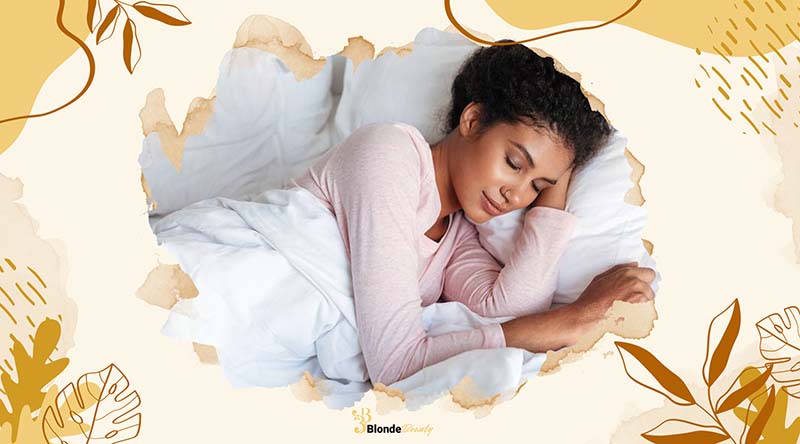If you’ve noticed more hair on your pillow lately, it’s natural to wonder, “Does lack of sleep cause hair loss?” Many people have this concern, and we’re here to explore the details together.
Yes, insufficient sleep can indeed contribute to hair loss. Not getting enough rest can disrupt your body’s hormonal balance and its ability to manage stress, both crucial for healthy hair growth.
Let’s examine the connection between sleep deprivation and hair health so you can understand the underlying factors and learn what steps you can take to address the issue.
Does Lack of Sleep Cause Hair Loss?
Poor sleep habits can indeed impact our overall health, and hair loss is one of the possible consequences of sleep deprivation. A Korean study conducted from 2002 to 2013 examined the effects of sleep disorders on hair loss.
The study found that patients with sleep disorders were at a significantly higher risk of developing alopecia areata compared to those without sleep issues.
Consistently not getting enough sleep can weaken hair follicles and disrupt hormone secretion. As a result, hair may become weak, dry, and dull. It’s important to note that while a period of poor sleep won’t always lead to alopecia, it can result in reduced hair density.
Note:
- To support hair health, prioritize good sleep hygiene by maintaining a consistent sleep schedule and creating a restful sleeping environment.
- Consider reducing caffeine and screen time before bed to improve sleep quality.
- If you suspect a sleep disorder, consult a healthcare professional for proper diagnosis and treatment.

Is Hair Loss From Lack of Sleep Reversible?
Usually, yes – but it depends on the underlying cause of both issues.
If hair loss is linked to stress, illness, or conditions like trichotillomania, there is a good chance that your hair can recover. Addressing these root causes can significantly improve both your sleep and hair health.
Here’s a three-pronged approach to tackle hair loss from lack of sleep:
Address the Root Cause: Identify and treat the underlying issues contributing to both sleep deprivation and hair loss. This may involve managing stress, seeking treatment for illnesses, or addressing behavioral conditions like trichotillomania.
Use Effective Hair-Loss Treatments: Incorporate treatments that promote hair growth and strengthen existing hair. Options include topical applications, supplements, or medications as recommended by a healthcare provider.
Improve Sleep Patterns: Work on enhancing your sleep quality by establishing a regular sleep schedule, creating a restful sleep environment, and practicing relaxation techniques before bed.
By addressing the root cause, utilizing effective treatments, and improving sleep habits, you can often reverse hair loss associated with lack of sleep and achieve healthier hair growth.
Note:
- Implement stress management techniques such as exercise, meditation, and relaxation practices.
- Consider consulting a dermatologist for personalized hair loss treatments, including topical treatments or supplements.

How Does Sleep Affect Hair Loss?
Sleep deprivation is a form of stress, and stress can certainly contribute to hair loss.
During sleep, our bodies undergo repair and regeneration processes. Without adequate sleep, these vital repairs are compromised.
Stress affects our bodies in various ways, including impairing skin function. If our skin isn’t functioning properly, our hair follicles can suffer. Sleep is crucial for the protein synthesis necessary for hair health; without it, this process is hindered.
Lack of sleep may even trigger hair loss and worsen genetic conditions such as androgenic alopecia. Poor sleep quality has also been associated with reduced melatonin levels, which can potentially lead to thinning hair.
Some studies suggest that melatonin can help halt hair loss in some cases and promote hair growth in others.
Note:
- Consider using a melatonin supplement if advised by a healthcare professional, particularly if you struggle with sleep quality.
- Engage in stress-reducing activities to minimize the impact of stress-related hair loss.
How Do I Prevent Hair Loss From Lack of Sleep?
If sleep deprivation is causing your hair loss, there are several strategies you can employ to prevent it.
While getting an adequate amount of sleep is ideal, it’s not always possible. Consulting a doctor about your sleep habits can provide insights and potential solutions to help you sleep better.
Change your Lifestyle to Improve Sleep Health
Preventing or reducing hair loss due to lack of sleep can often be achieved through simple lifestyle adjustments.
Improving sleep patterns, evening eating habits, and reducing alcohol consumption can significantly enhance hair quality and reduce shedding. There is a known link between alcohol and hair loss, so moderating intake can be beneficial.

Maintaining a regular sleep routine of 7-8 hours is crucial for managing cortisol levels. Here are a few additional tips to improve sleep:
Create a Bedtime Ritual
- Eat Healthily: A proper diet can positively impact your sleep quality. Avoid caffeinated drinks in the hours leading up to bedtime.
- Limit Technology Usage: Reduce screen time in the evening to help your body wind down. Keeping rooms dark and limiting electronics use after a certain hour can make a big difference.
- Relax Before Bed: Incorporate relaxation techniques, such as reading, meditating, or taking a warm bath, to reduce stress and promote better sleep.
Note:
- Consider using blackout curtains or an eye mask to create a darker sleeping environment.
- Establish a consistent sleep schedule, even on weekends, to reinforce your body’s natural sleep-wake cycle.
- If sleep issues persist, a healthcare professional can offer additional strategies or treatments to improve sleep quality.

Will My Hair Grow Back If My Sleep Improves?
Hair loss caused by lack of sleep is usually temporary. Once your sleep quality improves and cortisol levels return to normal, your body can resume its regular functions. While getting more sleep won’t directly trigger hair regrowth, it can help prevent further hair loss.
There are methods to support hair regrowth after losing hair due to poor sleep habits. If hair loss continues, it’s important to consult a professional to identify any underlying causes. A specialist can assess your situation and determine if other factors are contributing to your hair loss.
For women, hair loss often results from multiple factors, with lack of sleep being just one. To find the right treatment, obtaining an accurate diagnosis from a professional trichologist is crucial.
Note:
- Consider incorporating hair-boosting vitamins and minerals, such as biotin, vitamin D, and zinc, into your diet to support hair regrowth.
- Use gentle hair care practices to avoid additional stress on your hair, such as avoiding excessive heat styling and using a wide-tooth comb.
Conclusion
The connection between lack of sleep and hair loss is complex and multifaceted. So, does lack of sleep cause hair loss? Chronic sleep deprivation can indeed disrupt the hair growth cycle, leading to increased thinning and shedding.
By prioritizing quality sleep and using stress-reducing techniques, you can support healthy hair growth and improve your overall well-being. If you’re experiencing hair loss or sleep disturbances, seeking professional advice for personalized guidance and treatment options is highly recommended.
Don’t forget to check out more blogs from Blonde Beauty for additional tips and insights on achieving your best hair ever.

Laureate Professor Clare Collins
Professor Clare Collins is a leading expert in nutrition and dietetics at the School of Health Sciences, part of the College of Health, Medicine and Wellbeing. Her work is changing the way we think about food and health. She grew up as one of nine children and was the first in her family to finish high school and go to college. This background gave her a strong work ethic and a deep appreciation for seizing opportunities.
As the Director of the Hunter Medical Research Institute’s Food and Nutrition Program and a recipient of three NHMRC Research Fellowships, Professor Collins is making a big difference in public health. She focuses on helping people who are often overlooked, using new technologies like apps and online programs to improve their nutrition and reduce the risk of chronic diseases.
Professor Collins is well-respected and has been recognized as a Fellow in four major health and science organizations. She leads a diverse team of experts, including dietitians, computer scientists, and engineers, working together on global health projects.
Her achievements are impressive. She has received over $29 million in research funding, published more than 450 papers, and helped 35 PhD and Master’s students complete their degrees. She’s also active in sharing her knowledge with the public. She has developed tools like the Australian Eating Survey and the Healthy Eating Quiz, and she often appears in the media to talk about nutrition.
PUBLISHED ARTICLES
- Collins, C. (2019). “The Effect of a Pilot Dietary Intervention on Pain Outcomes in Patients Attending a Tertiary Pain Service.”
- Collins, C. (2022). “Variation in cardiovascular disease risk factors among older adults.”
- Collins, C. (2022). “Evaluation of an online intervention for improving stroke survivors’ health-related quality of life: A randomised controlled trial.”
These articles show Professor Collins’s commitment to understanding how better nutrition can improve health. Her work is important for researchers, doctors, and anyone interested in healthy living.
